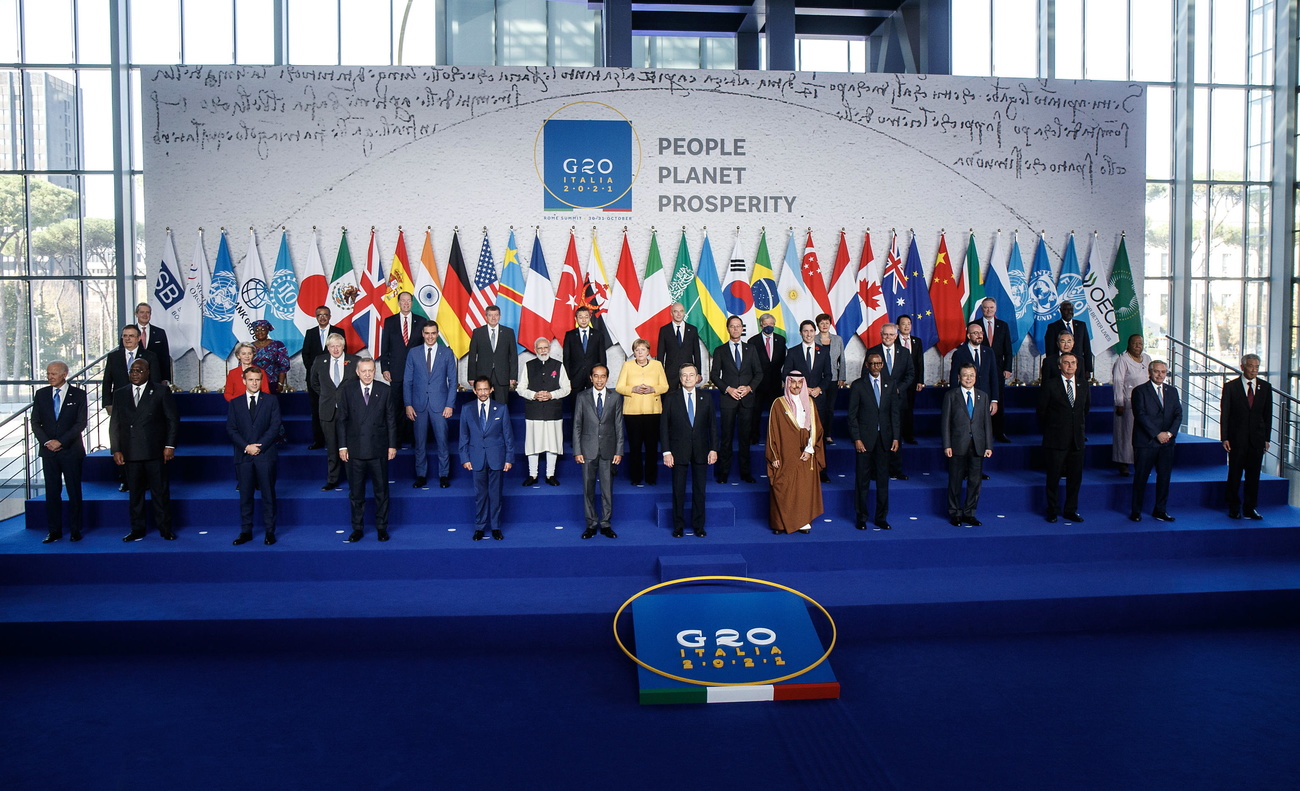Why is Switzerland backtracking on the plan for a minimum corporate tax rate?

In June, Swiss voters overwhelmingly approved a global agreement to implement a minimum corporate tax rate of 15%. The government is now considering postponing implementation. What’s the hold up?
It’s rare that Switzerland is a first mover when it comes to tightening the reins on big corporations. But the country has been a star pupil in implementing a global deal, led by the Organisation for Economic Co-operation and Development (OECD), to crack down on tax abuse by setting a minimum corporate rate of 15%.
“I am delighted to see the entire international community applying this agreement, including a country like Switzerland,” said Pascal Saint-Amans, who spearheaded the deal as the head of the OECD’s Centre for Tax Policy and Administration, after a nationwide vote in June. “Despite its particular history with taxation, Switzerland has clearly understood the advantage of cooperating with other countries.”

More
Swiss commission wants to stall minimum corporate tax rate
On June 18, some 78.5% of Swiss voted in favour of a constitutional amendment to allow for a minimum corporate tax rate of 15%. This was the sixth-highest approval rate for a popular vote in 20 years.
Proponents argued the bill would help change the perception of Switzerland as a tax haven. Although the country has eliminated many special tax privileges, it still has some of the lowest corporate tax rates in the world – especially in canton Zug, home to heavyweight multinationals like Glencore, where the statutory tax rate is around 11%.
The government planned to enforce the deal starting on January 1, 2024. But four months later, there are mounting calls to delay the reforms. On November 10, the Senate commission for economic affairs and taxation recommended postponing for at least a year. A spokesperson for the Federal Department of Finance told SWI swissinfo.ch that “the government will make a decision on this [whether to delay] in the next few weeks”.
Economic lobby groups, which had supported the minimum tax vote, have also since warned that going ahead as planned would be a blow to Switzerland as a business location.
Switzerland as the lone wolf
A key reason for the change of heart is that many other countries aren’t ready to implement the deal in 2024. Only a quarter of the 138 countries that signed on to the OECD minimum tax deal in October 2021 plan to implement it next year. This includes the European Union, Australia, Japan, South Korea and Canada.
In addition to the US, which many doubted would be ready by 2024, big economic players like China, India, and Brazil along with key business locations such as Singapore, Hong Kong, and the United Arab Emirates don’t plan to implement the deal next year.
Economic lobby groups argue countries that don’t adopt the minimum tax would suddenly have lower tax rates than Switzerland – and therefore be more attractive locations.

More
Switzerland’s tax haven reputation runs deep even with reforms
This is in part because of how the rules were designed, which allows a “top-up tax” or what the Swiss government refers to as a supplementary tax levied on excess profits when the tax rate is below the minimum rate of 15%. If Switzerland doesn’t impose the levy, other jurisdictions can.
Ahead of the June vote, campaigners, including Swiss Finance Minister Karin Keller-Sutter, argued that the country had to implement the tax deal quickly to avoid “giving away” millions in tax money abroad.
“The rules were designed in such a way that no country could escape the OECD minimum taxation in the long term,” a spokesperson from the federation of multinational companies, SwissHoldings, told SWI in an emailed statement. However, as more countries drag their feet, those that remain, like Switzerland, are becoming concerned.
“The economic disadvantages for Switzerland will increase if only a few competitor countries introduce the minimum tax in 2024,” said SwissHoldings.
Never-ending negotiations
The waning enthusiasm for what was hailed as a “historic milestone” back in 2021 can be explained in part to the practical challenges of implementing such a complex deal.
But another key factor is that the rules themselves have changed over the course of the last two years.

More
Switzerland fears impact of minimum corporate tax rate
Just this past July, a month after the Swiss vote, the OECD – under pressure from the US – adopted the “transitional safe harbor” rule, which allows a company in a country where the statutory tax rate is at least 20% to be exempt from additional foreign taxes until at least 2026.
Although the US corporate tax rate is 21%, tax credits can bring this below 15%. This transition measure buys the US Congress more time to agree on what has become a political hot button issue.
For economic lobby groups, the move undermined the principles of the minimum tax as it allows countries with high tax rates (at least on paper) to continue offering effective tax rates of less than 15% via concessions without other countries being able to apply the supplementary tax.
Many countries would now rather wait and see how things develop before pushing for reforms before 2026.

More
Global corporate tax deal reshapes how Switzerland attracts multinationals
“We assumed [in early summer] that the OECD would have developed and published all the important implementation guidelines by mid-2023,” wrote SwissHoldings in a letterExternal link to the Federal Tax Administration. “In addition to delays in new requirements, the OECD is constantly adjusting implementing regulations that have already been issued.”
Tax justice campaigners argue though that support for the OECD deal was already unraveling before this. A key point of contention was the 15% rate, which many found to be too low to stem profit shifting given that many developing countries have much higher rates.
“This was a sign that countries in the Global South didn’t have any influence on the outcomes at the OECD,” said Dominik Gross, who heads tax policy at the NGO Alliance Sud.
Some caveats and “loopholes” were also included that favoured wealthy countries such as a substance carve-out, which allowed countries to keep the rate below 15% as long as there was real business activity taking place in the country.
“The whole idea of redistributing additional revenue and stopping profit shifting to low tax areas was undermined by many of the rules,” said Gross.
According to a reportExternal link published in October by the Paris-based EU Tax Observatory, the global minimum tax, as things stand, would generate only a fraction of the tax revenue that was originally expected in 2021. Only 5% more tax revenue would be generated as opposed to 9% with a 15% rate and no loopholes, and more than 16% with a 20% tax rate.
Growing scepticism
Amid the changes, scepticism has been growing not only about the rules themselves but about the entire process and the OECD’s ability to bring people around the table.
SwissHoldings told SWI that there is a danger that the minimum tax deal won’t be implemented at all globally. However, it’s “more likely that the rules will be watered down to such an extent that they end up hurting no one and the 15% minimum tax only has to be complied with on paper”.
While OECD members, which includes 39 mostly wealthy countries, haggle over the rules, many non-OECD members and civil society groups feel they have been sidelined.
“The OECD introduced an inclusive framework, with the goal to engage countries that aren’t members, but the secretariat lies with the interest of the members, which are from northern, rich countries,” said Gross.
In response, there’s now a parallel effort underway at the United Nations. On November 22, 125 UN Member States backed a UN resolutionExternal link, put forward by African nations, to promote “inclusive and effective tax cooperation”. Switzerland and the US, among several other wealthy countries, rejected the resolution but it was lauded by tax justice activists and many economistsExternal link.
Although SwissHoldings points out challenges of working through the UN, it doesn’t reject that it could play a more important role. “If the OECD, which has been the leader in the tax area up to now, were to fail [with pillars of the tax deal] the UN could gain in importance in the tax area.”
Edited by Marc Leutenegger.

In compliance with the JTI standards
More: SWI swissinfo.ch certified by the Journalism Trust Initiative












You can find an overview of ongoing debates with our journalists here . Please join us!
If you want to start a conversation about a topic raised in this article or want to report factual errors, email us at english@swissinfo.ch.